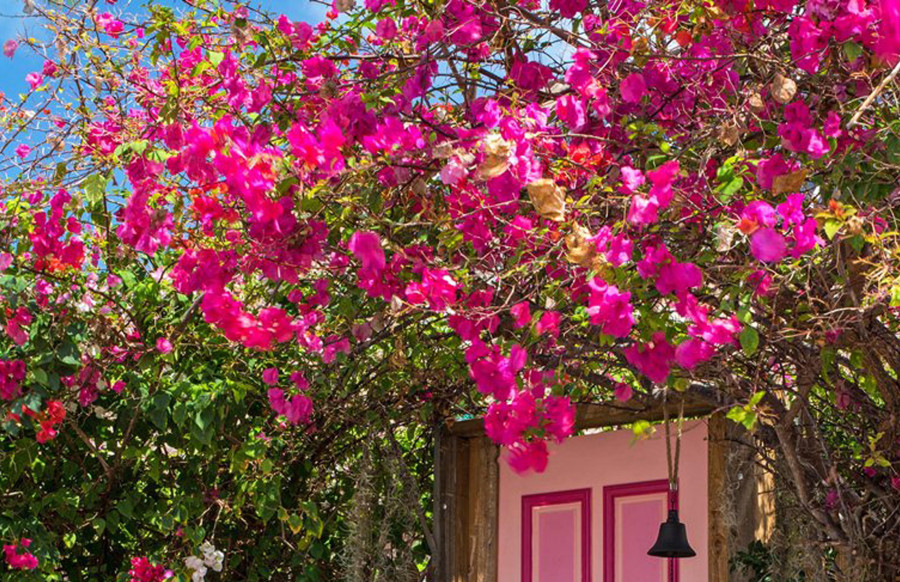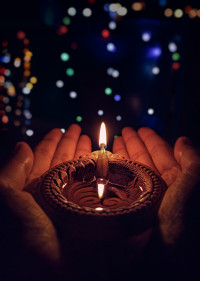As it is
Let the bougainvillea vines grow
It takes an appreciation of the little things to prepare for a journey to mindfulness.
Asmita Manandhar
It sounded urgent, the way Ma called me. I rushed out of my room and followed her voice. She was squatting beside one of her many planters in the front-facing balcony, with a mysterious but gleaming smile on her face. There was a leaf sitting on one of her palms. But when she stretched out that palm towards eight-year-old me, I squealed in horror and ran back to my room.
It was a green caterpillar-like insect, perfectly camouflaged with the leaf. My Ma must have found her friend when she was carrying on with her daily routine of picking dead leaves from her extensive collection of plants.
The whole neighbourhood knew my Ma was a plant lady. The magenta inflorescence of bougainvillea vines that ran from the front porch to the second-floor terrace made our house some sort of a landmark in the area.
But unlike what our neighbours believed, her fondness wasn’t for colourful flowers. Her soul lay in the process—of choosing pots, filling them with soil, watching the plants grow, blossom into flowers, and then wither back into that same dirt. She lived many lives in her many plants. And so, when visitors would arrive, like the day she found the green insect, she wouldn’t hesitate to make their acquaintance.
That day, I remember she had asked me to come back and take a closer look at it. She was clearly in awe of the insect. “Look how beautiful it is,” she had said. “It’s a wonder how nature works.” But regardless of how long Ma would marvel at the ‘beauty’, I knew it had to go. The insect wasn’t going back into her pots. She was and still is fiercely protective of her plants.
Unlike insects, which were carried down to the fields, humans weren’t offered the same courtesy. My mother used to yell from our first-floor window if she caught anyone trying to steal her flowers. I cannot explain how embarrassed I used to be when she did that.
As I grew up, I thought I understood her annoyance. I saw her hard work, dedication and love for her plants. So, I started supporting her when she forbade people from plucking her flowers. She chose the plants, bought them, put days of work into them, she owned them, and how can someone just reap the benefits of her sweat—it was indeed unfair.
But then I didn’t know, I was terribly wrong.
Two decades after the green insect’s visit, we no longer lived in the house covered in bougainvillaea vines. So instead of a huge structure for a house and hundreds of pots on the terrace, we instead have a small home and a huge garden. One winter morning, while both my Ma and I were in our garden, I heard her jovially exclaim, “Oh! A new blossom.”
I had suffered from insomnia the night before and had dragged myself out of bed to prepare myself for work. The lack of sleeplessness and inability to fix an appointment with my therapist was lingering like a dark cloud over my head. But the delight on Ma’s voice caught my attention.
“It wasn’t there till yesterday evening,” she said to me, pointing at a plant, and smiling like a child.
Her happiness was infectious, but at that moment, I just couldn’t understand. It made me wonder, after all these years, how could she still celebrate such little joys in life, while I, her blood and flesh, am on pills to get over daily doses of hopelessness and anxiety. It was a question I asked myself and quickly realised, was an answer in itself.
Flesh and blood, all that is there, is the gift of the soil. What I had believed years ago didn’t justify my Ma’s love for the plants. It wasn’t just love either—it was her sincere gratitude of life. Her fondness for flora and fauna stems from her devotion towards the power of the soil to offer life. She wasn’t protective of her plants because she owned them, but it was because she respected them and asked the same from others. She wanted to let everything run its natural course. She had seen many lives blossom as much as deaths—that is how she found the balance between optimism and morbidity.
Her glee hinged upon nothing but herself; and here I was, fiddling over the tiniest of glitches, brought upon by no one but myself. But the crux of the matter is how I didn’t choose her eyes or jaw, I cannot own her mindfulness either.
It was then I understood the gravity of her statement, “It’s a wonder how nature works.”
It is no less than nature’s wonders that my Ma’s heart sits still even after all the struggles she has undergone in her life. From a girl who grew up in the centre of the city, yet on the edge of poverty, to a woman of patience and determination, now I understand her courage is derived from her sincerity to not hold back from getting her hands dirty. But most importantly, she allows things to unravel like the way bougainvillea vines grow.




 13.12°C Kathmandu
13.12°C Kathmandu.jpg)










